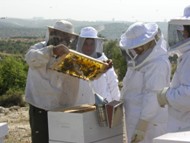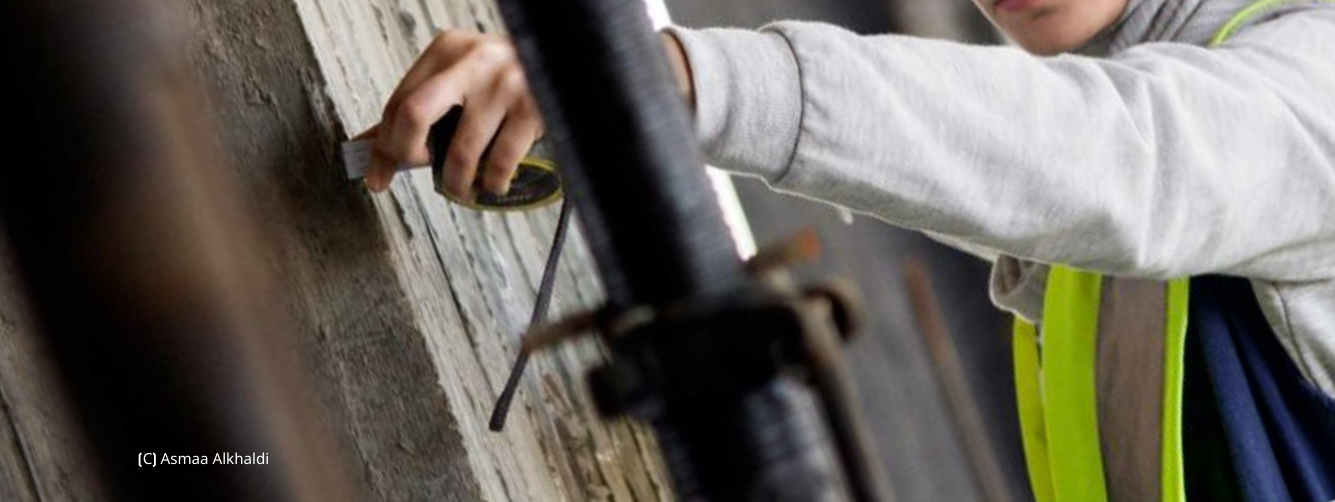
“I found a way to serve my community”
Ilham Karajeh from Deir Ibzee’ was a participant in MIFTAH’s “Women and Elections” project, which began in 2005 and also in the “Empowerment of Palestinian Women in Rural Areas through Small Income Generating Projects”, which began in 2008.
Karajeh is the perfect example of an ambitious woman who can only be described as a fighter. She fought for her right to work in the community in spite of the many obstacles put in her way by the machismo mentality in her village. Still, she persevered and challenged all of these difficulties through her belief in women’s role in public life and community work alongside of men. Today she is well known in her village and is very active in encouraging the role and participation of women in her community. Hence, when local elections were announced in 2005 with a women’s quota, Karajeh was quick to run. And she won. She was one of the first women who participated in her village’s local council. She assumed this duty over and above her other responsibilities of running a household and raising six children. And while the job came without any type of financial compensation along with a myriad of challenges, Karajeh chose to become an example for women in her village to support them in every way possible.
Tell us a bit about yourself
I am a member of the Deir Ibzee local council and head of the Women’s Cooperation Society, established in 2007, which offers social services to village residents through supporting small projects. It offers loans to low income residents, holds capacity building workshops and small projects such collecting money to build classrooms.
What has your relationship with MIFTAH been like?
I was introduced to MIFTAH in 2005 when the organization held a workshop in the village on elections within its Women and Elections Program. I was attracted to the workshop because I wanted to be involved in serving my community. I have always felt the ability to do this and I was given this opportunity when I ran for membership in our village council. MIFTAH then provided me with all the support I needed to carry this through, whether moral support or through its workshops and trainings, all of which I attended. The workshops gave me all the information I needed, both in terms of the knowledge I acquired and at the level of my personal growth since they were all about the empowerment of women.
What makes MIFTAH unique in your opinion?
There are other institutions working in the field of women’s support. However, I wanted to continue with MIFTAH because I trusted their coordinators who were very trained and aware of women’s issues. Also, the organization is extremely supportive of women’s issues from various aspects, which became apparent in a number of situations and problems we faced as women in local councils such as being marginalized or discriminated against. In these situations, we would always turn to MIFTAH for help. MIFTAH is a pioneer organization in our society with a very good reputation. It would help us solve problems we could not solve ourselves as individuals and women because of social norms and traditions prevalent in our village. MIFTAH also connected us with other organizations that support women including ministries where we could lodge complaints. One example of this is when the organization brought us together with our counterparts in local councils in Gaza via videoconference with the deputy ministry of local government. MIFTAH’s support and encouragement has always been very tangible, not just promises. It opened new horizons of professional development for me.
Karajeh also fulfilled her ambition to serve her community and help women improve their conditions through participating in MIFTAH’s Empowerment of Palestinian Women in Rural Areas through Small Income Generating Projects”. She speaks a bit about that experience:
Within this project, MIFTAH proposed different activities we could be involved in, including a beekeeping project. Eight women in need of work from the village benefited from this. I chose the beekeeping project because I heard it had the potential for success and sustainability. I believe if there’s a will, there’s a way. MIFTAH continued to train us eight women, both theoretically and on the ground. We started work in April, 2009 and picked an appropriate spot for putting the beehives where there is water close by and a shed for the equipment. We produced 900 kilos of honey, which was distributed amongst the eight participants. The ninth share of honey we sold so that we could buy the necessary materials to continue the project. If there was anything lacking, we would cover the costs ourselves.
Was that the end of MIFTAH’s involvement?
No, MIFTAH did not abandon us after we harvested the honey. It gave us marketing courses and each beneficiary marketed her own share. We also participated in the Beekeeping Association in Ramallah where we sold some of our products.
How much of a difference do you think this project made on the women of Deir Ibzee’?
There is a tangible difference in the women and their activities in the village. Before the projects, most of them were restricted to housework. However, their participation in MIFTAH’s project has encouraged them to get out, participate and contribute. They are now more interested in activities and want to benefit from them.
Do you have any suggestions for the future?
I would like to see a project for land reformation to make it harvestable, so that it will stop the Israeli occupation, which continues to confiscate land. I think it is very important that women are empowered and confident so they can also gain the confidence of their community and be able to achieve everything they strive for.






